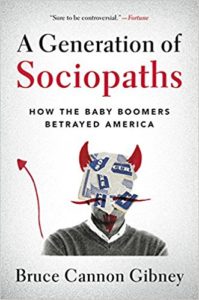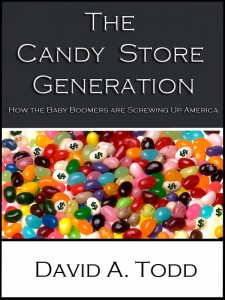
I mentioned before that I’m currently reading A Generation of Sociopaths: How the Baby Boomers Betrayed America, by Bruce Gibney. I’m now more than halfway through it, maybe as much as 2/3rds. I probably won’t finish by this weekend; maybe next. When I do, I’ll post a full review here, as well as at Amazon and Goodreads.
As I said in another post, I took interest in this book because of the book I published back in 2012, The Candy Store Generation: How the Baby Boomers Are Screwing-Up America. Similar title, obviously a similar subject. I had to read it. Fortunately, his publicist gave me an advance reader copy, no charge. That’s great.

I’m just about to the point where Gibney is going to give some solutions, I think some overall solutions. So far he’s been outlaying the problem as he sees it. As I did, he covers how the Boomers took over the leadership in the U.S.A. in the 1990s, though he talks more about their influence as a voting block before that, and how that influence caused their predecessors to make some bad decisions. He also has a different definition of Boomers than I did. He says it’s those born from 1940 to 1964, and only the white people. Most sociologists place the start of the Boomers as 1946. However, in my book, I did say that those born from 1940 to 1945, the “Elvis Wave” of the Silent Generation, had much in common with the Boomers, especially the Elvis Wave of the Boomers (born 1946-1950).
The main premise we each have is about the same: The Boomers are guilty of intergenerational theft by piling up the massive debt this country has. It was $16 trillion when I published my book. It’s $20 trillion now. While we have the same premise, we have different conclusions as to why the Boomers have performed so poorly in leadership. I say it’s because the Boomers relied too much on government to solve problems better solved by the individual. He says it’s because the Boomers relied too little on government. Same problem exhibited by the same symptoms, but a drastically different conclusion.
The one thing you can say we agree on, as another way of stating the premise: The Boomers did not provide a firm basis of government finance to support the services they had the government provide. I say it’s because they demanded too many services; he says it’s because they wouldn’t tax themselves enough to pay for the services. Perhaps it’s two sides of the same coin. Either way, the coin was stolen from the Boomers’ children’s retirement fund, and from their grandchildren’s college fund.
As I get further into the book, I may find that Gibney’s conclusions aren’t quite what they appear to be on my incomplete reading. We’ll see. One thing he did less than me was try to explain why the Boomers are the way they are. I took a whole chapter on that, based on what I lived through and how, looking back over years and decades, I can see how that caused us to have certain characteristics. He touches on that a little, but focuses almost exclusively on the results the Boomers have produced, rather than on what caused their “pathology”, as he would call it.
Hopefully, when I finish reading Gibney’s book, I’ll be able to say something more positive about it. At the moment, I think my book is better. I may be a little biased, however. Back to reading, writing, researching, and making a mess in The Dungeon.